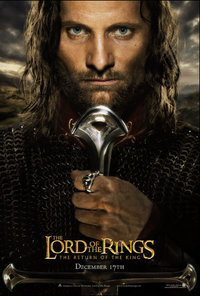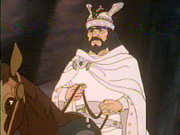Aragorn
Aragorn II, later crowned King Elessar Telcontar, (T.A. 2931 - F.A. 120) 26th King of Arnor, 34th King of Gondor and First High King of the Reunited Kingdom, is a fictional character from J. more...
R. R. Tolkien's fantasy universe of Middle-earth.
Biography
Aragorn was born on March 1 in 2931 of the Third Age, as the son of Arathorn II and his wife Gilraen. Aragorn is a direct descendant of the elder son of Elendil, Isildur (he is Isildur's great x 37 grandson). Elendil founded the kingdoms of Gondor and Arnor in Middle-earth after his homeland of Númenor was destroyed in S.A. 3319. Aragorn is named after his ancestor, Aragorn I.
Through his ancestor Elendil, Aragorn is a descendant of Elros Tar-Minyatur, Elrond's brother and the first king of Númenor.
While Aragorn was still an infant, his father was slain hunting Orcs. Like many of his ancestors, Aragorn was fostered in Rivendell by the elf-lord Elrond. At the request of his mother, his identity was kept secret, as she feared he would be slain like his father and grandfather if his true identity as the Heir of Isildur became known. Aragorn was named Estel (Sindarin for "Hope") instead, and was not told about his heritage until he came of age in 2951.
At that time Elrond revealed to "Estel" his true name and ancestry, and delivered to him the shards of Narsil. It was also around this time that, in the woods of Imladris (the Elvish name of Rivendell), Aragorn met and fell in love with Arwen, daughter of Elrond, who had newly returned from her mother's homeland of Lórien.
From then on, Aragorn assumed his proper role as sixteenth of the Chieftains of the Dúnedain of the North, and went into the Wild, where dwelt the remnants of his people, whose kingdom had been destroyed through civil and regional wars centuries before.
In 2953 he was not present in Rivendell for the last meeting of the White Council. Aragorn met Gandalf the Grey in 2956, and they became great friends. At Gandalf's advice he and his followers began to guard a small land known as the Shire, inhabited by the diminutive and agrarian Hobbits, and he became known among the peoples just outside the Shire's borders as Strider.
From 2957–2980 Aragorn took great journeys, serving in the armies of King Thengel of Rohan, and Steward Ecthelion II of Gondor. Many of his tasks weakened Sauron and his allies, which during the War of the Ring helped the West survive. His name in Gondor and Rohan was Thorongil (Eagle of the Star), and with a Gondorian attack force he led an assault on the long-standing rebel province of Umbar in 2980, taking the city and slaying its lord. Later in 2980 he visited Lórien, and there once again met Arwen. He gave her the heirloom of his House, the Ring of Barahir, and Arwen pledged her hand to him in marriage, renouncing her Elvish lineage and accepting the Doom of Men: death.
Elrond withheld from Aragorn permission to marry his daughter until such time as his foster son should be king of both Gondor and Arnor. This seemingly harsh condition should be judged both in light of its most similar precedent — the elf-lord Thingol's request that the mortal Beren wrest a Silmaril from the Dark Lord Morgoth before marrying Thingol's daughter Lúthien — and of Elrond's (and Aragorn's) knowledge that to marry a mortal his daughter would be required to herself choose mortality, and thus deprive the deathless and wifeless Elrond of his greatest remaining love. Elrond was also concerned for Arwen's own happiness, fearing that in the end she might find death, both her own and that of her beloved, difficult to bear.
In 3009 Aragorn went at Gandalf's request into Rhovanion in search of Gollum. He finally caught the creature in the Dead Marshes in sight of Mordor, and brought him as a captive toThranduil's halls in Mirkwood, where Aragorn questioned him.
On September 30, 3018, Aragorn was waiting in the Inn of the Prancing Pony in Bree, near the northeastern borders of the Shire, where he introduced himself to Frodo Baggins, and began his role in the War of the Ring. Aragorn was aged 87 at that time, nearing the prime of life for one of royal Númenórean descent.
The restoration of the line of Elendil to the throne of Gondor is a major subplot of The Lord of the Rings; Aragorn's adventures not only aid Frodo in his Quest, but also bring him closer to his own kingship — which, although his by lineage, has due to historical and legal circumstances been left open for centuries, with the people of Gondor under the rule of Stewards, while it was widely doubted whether any of the royal line still lived. Aragorn overcame all doubts as to his legitimacy with his accomplishments during the War of the Ring, as well as by his gracious and noble character. During the last weeks of the war, he won over the most important figures in Gondor, including the last ruling Steward, Faramir.
Aragorn was the founder of the West's endgame strategy in the War of the Ring. Prior to the downfall of Isengard, there was no clear plan which recommended itself to Gondor and Rohan, but when Aragorn recovered the Palantir of Orthanc, a stone which allowed direct communication with Sauron, he determined to show himself as the Heir of Isildur. He fooled Sauron into believing that he possessed the One Ring. Following up on this ruse became Gandalf's basic policy when he took over Gondor's military command after the incapacitation of the Steward Denethor.
Aragorn's unexpected arrival at the Battle of Pelennor Fields leading Gondor's Southern Army turned the tide of the battle and brought about the decisive victory over Mordor's armies.
Essential to Aragorn's personal popularity in Gondor were his abilities as a healer, which he exercised most notably on the evening following the Battle of the Pelennor Fields. Aragorn healed Faramir, who had been expected to die; this won him the immediate recognition of the Steward as the rightful heir to the throne, and his humility and self-sacrifice gained him the hearts of the inhabitants of Gondor's capital city.
Read more at Wikipedia.org




